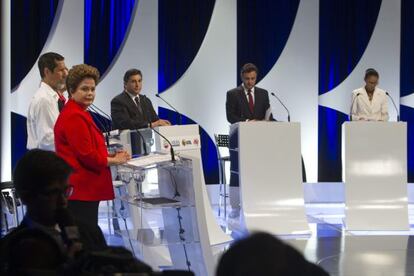Rousseff aims straight for Silva in second presidential TV debate
Brazilian leader targets new Socialist candidate in bid to recover lost ground ahead of October vote


The golden rule during the second televised debate between Brazil’s presidential candidates was clear: any contender could ask questions of any other contender. And President Dilma Rousseff, who had first choice, went straight for her target: Marina Silva, the new leader in the opinion polls.
Rousseff, of the Workers’ Party (PT), had left the Brazilian Socialist Party contender alone during the first televised debate, preferring to focus instead on Social Democrat Aécio Neves, who until recently was her most serious rival.
But now that Silva has become the unquestioned leader in the polls after replacing Socialist Party chief Eduardo Campos – who died in a plane crash on August 13 – the incumbent aimed for her new rival’s weak points.
Brazilians wanted to know how Neves and Rousseff would try to counter the “Silva effect”
“How are you going to raise all the money you need to keep all the promises that you’re making?” asked Rousseff.
Silva provided vague replies that contained no figures (“we will make the right choices; we will not make the wrong choices”) and Rousseff insisted: “You talk and talk but you fail to answer the question.”
And so the seven-person debate became a duel between the two hopefuls with the best chances of winning the election in the fall, according to the polls.
The strategies were clear: Rousseff accused Silva of hiding behind vague rhetoric, while the Socialist contender criticized the president for her alleged inability to see her own mistakes, especially in relation to the economy, which has just entered what experts term “a technical recession.”
The televised event was widely watched, with many Brazilians keen to know how Aécio Neves and Dilma Rousseff would try to counter the “Silva effect.” The former environment minister has become the undisputed star of this presidential campaign in recent weeks, and the subject of great media attention.
The incumbent aimed straight for her new rival’s weak points, chiefly her vague rhetoric
President Rousseff’s next question aimed at another weak point in Silva’s program, the exploitation of Brazil’s deepwater oil reserves. Again, Silva gave a noncommittal answer that made reference to oil but also to other types of green energy sources that need to be explored.
“Those reserves mean wealth for this country,” the president retorted. “They are resources for education and healthcare. You never commit to anything. Your speeches are full of generic sentences.”
For her part, Silva reiterated her key message about the need to change “old ways of doing politics” and criticized Rousseff for not accepting her share of the blame for the economic downturn.
“It’s not fair that when the country is doing well, it’s because you’re doing a good job, and when it is doing badly, it’s because of the economic crisis in other countries,” she said. “Your mistakes are being paid by people who lack good services and who came out on the streets over a year ago to protest that fact.”
Meanwhile, Aécio Neves of the conservative PSDB went mostly unnoticed, although he insisted on the need to change tack “so that Brazil will grow again.” Increasingly, it seems like the third most popular candidate in the polls will fail to make the cut on October 5, when the first round of voting takes place. The Brazilian presidential election is looking more and more like a two-horse race.
Tu suscripción se está usando en otro dispositivo
¿Quieres añadir otro usuario a tu suscripción?
Si continúas leyendo en este dispositivo, no se podrá leer en el otro.
FlechaTu suscripción se está usando en otro dispositivo y solo puedes acceder a EL PAÍS desde un dispositivo a la vez.
Si quieres compartir tu cuenta, cambia tu suscripción a la modalidad Premium, así podrás añadir otro usuario. Cada uno accederá con su propia cuenta de email, lo que os permitirá personalizar vuestra experiencia en EL PAÍS.
¿Tienes una suscripción de empresa? Accede aquí para contratar más cuentas.
En el caso de no saber quién está usando tu cuenta, te recomendamos cambiar tu contraseña aquí.
Si decides continuar compartiendo tu cuenta, este mensaje se mostrará en tu dispositivo y en el de la otra persona que está usando tu cuenta de forma indefinida, afectando a tu experiencia de lectura. Puedes consultar aquí los términos y condiciones de la suscripción digital.








































